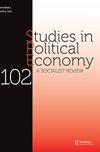企业权力、化石资本、气候危机:介绍企业测绘项目
Q3 Social Sciences
引用次数: 2
摘要
本主题部分的三篇文章来自企业地图项目(CMP),这是一个由大学和社区研究人员和活动家组成的合作伙伴关系,他们共同调查加拿大化石燃料开采行业的力量。我们于2015年在油价暴跌和巴黎气候谈判前夕启动,迄今为止,我们的工作是在政治-经济动荡、冲突和抵抗加剧以及气候影响恶化的时期进行的。这三篇文章共同揭示了到本世纪中叶减少化石燃料生产的必要性,以及加拿大作为一个生产国所面临的巨大障碍,其政治、经济和文化特征在很大程度上取决于资源开采。事实上,《议定书》缔约方会议正是试图阐明和帮助打破这种困境。CMP(我们共同指导)将化石资本的关键政治经济学/生态学与行动研究、公共社会学和政策分析举措相结合,支持活动家社区为公正和可持续的后碳时代未来进行紧迫而激烈的斗争。由维多利亚大学主办,由维多利亚大学、加拿大替代政策中心(不列颠哥伦比亚省和萨斯喀彻温省办事处)和阿尔伯塔省帕克兰研究所联合领导,CMP:本文章由计算机程序翻译,如有差异,请以英文原文为准。
Corporate power, fossil capital, climate crisis: introducing the Corporate Mapping Project
The three essays in this theme section are from the Corporate Mapping Project (CMP)— a partnership of universityand community-based researchers and activists who, together, investigate the power of Canada’s fossil-fuel extractive sector. Launched in 2015 amid a collapsing oil price and during the lead-up to the Paris climate talks, our work to date has been conducted during a period of tremendous political–economic churn, sharpening conflict and resistance, and worsening climate impacts. Together, the three essays starkly reveal the imperative to wind down fossil fuel production by mid-century, as well as the tremendous barriers confronting Canada as a producer-country whose political, economic, and cultural character has been defined so heavily by resource extraction. Indeed, it is this quandary that the CMP seeks to illuminate and help break. The CMP (which we codirect) combines a critical political economy/ecology of fossil capital with action research, public sociology, and policy-analysis initiatives that support activist communities in the urgent and intensifying struggle for a just and sustainable postcarbon future. Hosted by the University of Victoria, and led jointly by the University of Victoria, the Canadian Centre for Policy Alternatives (BC and Saskatchewan offices), and the Alberta-based Parkland Institute, the CMP:
求助全文
通过发布文献求助,成功后即可免费获取论文全文。
去求助
来源期刊

Studies in Political Economy
Social Sciences-Political Science and International Relations
CiteScore
1.00
自引率
0.00%
发文量
12
期刊介绍:
Studies in Political Economy is an interdisciplinary journal committed to the publication of original work in the various traditions of socialist political economy. Researchers and analysts within these traditions seek to understand how political, economic and cultural processes and struggles interact to shape and reshape the conditions of people"s lives.
 求助内容:
求助内容: 应助结果提醒方式:
应助结果提醒方式:


